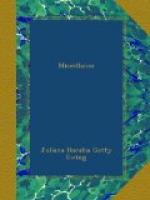“God bless you, Dorolice! You know I promised. Thank you, for ever!”
“If you fancy you have any reason to thank me,” I said, “do me this favour. Whatever happens, believe that I believe!”
I could bear no more, so I went out of the kitchen. As I went I heard a murmur of pity run through the room, and I knew that they were pitying—not the dead man, but me; and me—not for my dead brother, but for his murderer. When I got into the passage, the mist that had still been dark before my eyes suddenly became darker, and I remember no more.
When my senses returned, Harriet had come home. From the first she would never hear George’s name except to accuse him with frantic bitterness of poor Edmund’s death; and as nothing would induce me to credit his guilt, the subject was as much as possible avoided. I cannot dwell on those terrible days. I was very ill for some time, and after I had come down-stairs, one day I found a newspaper containing the following paragraph, which I copy here, as it is the shortest and least painful way of telling you the facts of poor Edmund’s death.
“THE MURDER AT CROSSDALE HALL.
“Universal horror has been excited in the neighbourhood by the murder of Edmund Lascelles, Esq., of Crossdale Hall. Mr. Lascelles was last seen alive a little after ten o’clock on Friday night, at which time he left the house alone, and was not seen again living. At the inquest on Saturday, James Crosby, a farm labourer, gave the following evidence:—
“’I had been sent into the village for some medicine for a sick beast, and was returning to the farm by the park a little before eleven, when near the low gate I saw a man standing with his back to me. The moon was shining, and I recognized him at once for Mr. George Manners, of Beckfield. When Mr. Manners saw me he seemed much excited, and called out, “Quick! help! Mr. Lascelles has been murdered.” I said, “Good God! who did it?” He said, “I don’t know; I found him in the ditch; help me to carry him in.” By this time I had come up and saw Mr. Lascelles on the ground, lying on his side. I said, “How do you know he’s dead?” He said, “I fear there’s very little hope; he has bled so profusely. I am covered with blood.” I was examining the body, and as I turned it over I found that the right hand was gone. It had been cut off at the wrist. I said, “Look here! Did you know this?” He spoke very low, and only said, “How horrible!” I said, “Let us look for the hand; it may be in the ditch.” He said, “No, no! we are wasting time. Bring him in, and let us send for the doctor.” I ran to the ditch, however, but could see nothing but a pool of blood. Coming back, I found on the ground a thick hedge-stake covered with blood. The grass by the ditch was very much stamped and trodden. I said, “There has been a desperate struggle.” He said, “Mr. Lascelles was a very strong man.” I said, “Yes; as strong as you, Mr. Manners.” He said, “Not quite; very nearly though.” He said nothing more till we got to the hall; then he said, “Who can break it to his sister?” I said, “They will have to know. It’s them that killed him has brought this misery upon them.” The low gate is a quarter of a mile, or more, from the hall.’




